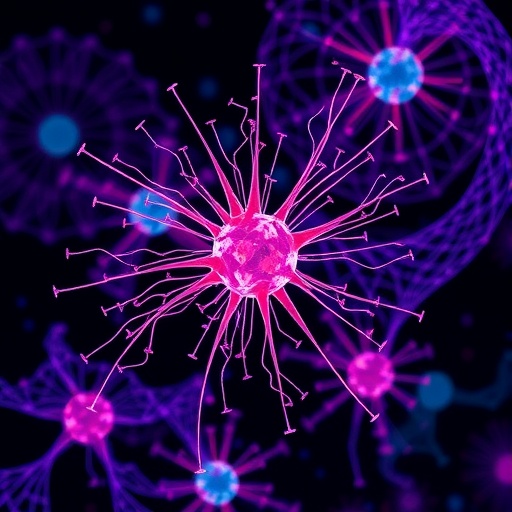In the ever-evolving landscape of oncology research, cutaneous squamous cell carcinoma (cSCC) emerges as a pivotal subject due to its rising incidence and significant morbidity among skin cancers. In an eye-opening study conducted by a team of researchers led by Dr. YZ Sun, the intricate tapestry of epigenetic regulatory networks governing cSCC progression was illuminated through a revolutionary approach known as multi-omics analysis. This innovative method amalgamates various biological data streams to provide a comprehensive snapshot of cancer’s underlying mechanisms, leading to potential new pathways for therapeutic intervention.
The malignant transformation of skin cells into cSCC is often triggered by an interplay of environmental factors, particularly ultraviolet (UV) radiation exposure. However, the transition from normal cellular mechanisms to pathological growth involves not just genomic mutations but also complex epigenetic modifications that act like molecular switches. This study endeavors to unravel this complexity, probing beneath the surface of genetic sequences to identify how epigenetic factors manage gene expression in the context of cancer. The researchers utilized an array of omics approaches, including genomics, transcriptomics, proteomics, and metabolomics, to catalogue the myriad changes that occur at every level of cellular structure and function.
Dr. Sun and his colleagues meticulously gathered samples from patients diagnosed with cSCC, aiming to delve into the altered epigenetic landscape that characterizes the disease. By analyzing DNA methylation patterns, histone modifications, and non-coding RNA expression levels, the team delineated a framework of regulatory networks that play crucial roles in tumor initiation and progression. The correlation between these epigenetic changes and genomic alterations sparked significant revelations regarding the disease’s pathophysiology, offering insights into potential biomarkers for early diagnosis and prognosis.
In their findings, the researchers observed that specific epigenetic modifications could either promote or suppress the expression of oncogenes and tumor suppressor genes, providing a duality that complicates therapeutic strategies. For instance, hypermethylation of promoter regions silenced vital genes responsible for inhibiting tumor growth, while hypomethylation in other regions led to the overexpression of genes that favor cancer cell proliferation. This crosstalk between different regulatory networks emphasizes the necessity for targeted therapies that can address these epigenetic modifications without adversely affecting normal cellular processes.
Additionally, the study highlighted the interaction between genetic factors and the environment, showcasing how external stimuli, such as UV exposure, can exacerbate or mitigate epigenetic changes. The implication is profound—patients with different genetic backgrounds may respond uniquely to environmental factors, leading to varied susceptibilities to cSCC. Such data underscore the importance of personalized medicine, where unique genetic and epigenetic profiles dictate tailored treatment approaches.
One of the compelling aspects of this research was the identification of specific non-coding RNAs as significant players in the epigenetic regulation of cSCC. Long non-coding RNAs (lncRNAs) and microRNAs (miRNAs) were implicated in the modulation of crucial signaling pathways associated with tumor growth and metastasis. Their ability to regulate gene expression at multiple levels adds a layer of complexity, positioning them as potential therapeutic targets. Future studies may focus on harnessing these molecules for novel therapeutic strategies.
The multi-omics approach also unveiled a wealth of data concerning tumor microenvironment interactions. The crosstalk between cancer cells and surrounding non-cancerous tissues revealed that these interactions are not merely passive; rather, they play a proactive role in shaping the tumor phenotype. Understanding these dynamics could revolutionize how therapies are designed, shifting the focus from targeting the tumor alone to also considering the supportive microenvironment.
Moreover, the implications of this research extend beyond cSCC. The methodologies and findings can serve as a blueprint for understanding other malignancies, potentially accelerating the pace of discovery in cancer therapeutics. By embracing a multi-faceted approach that accounts for the complexity of biological systems, researchers can identify universal patterns that transcend individual cancers.
In conclusion, the study led by Dr. Sun and his team serves as a clarion call for the integration of multi-omics analysis in cancer research. By harnessing the nuances of epigenetics and their interplay with genetic factors, we can unlock new avenues for early detection, risk stratification, and treatment modalities. The findings not only deepen our understanding of cutaneous squamous cell carcinoma but also pave the way for a future where personalized, epigenetically-informed therapies become the standard of care. As we stand on the threshold of a new era in oncology, this research is a pivotal step toward deciphering the complexities of cancer biology.
Collaborations between oncologists, geneticists, and epigeneticists will be crucial as the research community seeks to translate these findings into viable clinical strategies. The potential to target epigenetic modifications presents a promising frontier, where therapies could be designed to reverse these aberrations, returning cancer cells to a normal state. Ultimately, the goal is clear: to improve patient outcomes and enhance the quality of life for those affected by cSCC and other malignancies, relying on the power of knowledge acquired through advanced research methodologies.
The future of oncology lies in our ability to understand the distinct mechanisms driving cancer progression. As research continues to evolve, the integration of comprehensive data analyses will facilitate breakthroughs that we have only begun to glimpse. These combined efforts can render cancer not just a series of disparate diseases but a cohesive entity understood at a molecular level, leading to transformative approaches in how we diagnose, treat, and ultimately conquer cancer.
Subject of Research: Cutaneous Squamous Cell Carcinoma and Epigenetic Regulatory Networks
Article Title: Multi-omics analysis reveals the crosstalk of epigenetic regulatory networks in cutaneous squamous cell carcinoma progression
Article References:
Sun, YZ., Zou, DD., Li, XJ. et al. Multi-omics analysis reveals the crosstalk of epigenetic regulatory networks in cutaneous squamous cell carcinoma progression.
J Transl Med 23, 1281 (2025). https://doi.org/10.1186/s12967-025-07262-z
Image Credits: AI Generated
DOI: https://doi.org/10.1186/s12967-025-07262-z
Keywords: Cutaneous squamous cell carcinoma, epigenetics, multi-omics, cancer progression, personalized medicine, tumor microenvironment, non-coding RNAs.




